There have never been bounds to the work of the Blizzard Sow, and the Boppe brothers do not care about crossing borders on their own, with their fresh nails and boots. In the mid-2000s, I had the honor of being asked by the ethereal duo to produce their new album, The born-again is dead.
After the epic recording of their Foggy songs for the first periods, and following the (successful) release of Ismaëll from the asylum, the Boppe brothers wanted to make things great with a folk opus, anchored in the social reality of their native bayou, and politically at the height of all the most desperate commitments. At the counterpoint of the world as it was going, they honored the birth of their first adopted in vitro daughter with a tribute to old born-again christians at the end of their life.
Faithful to their atavism of Karajan from the steppes, they gathered around them a selection of the best musicians that serious and popular music can offer : Sir Adama Ndélé and his golden strangler fingers on bass, the steely voices of the Golden Bulgarian Choir and the haunting choirs of the (internationally renowned) Koulak Goule and Ghost Von Sydow, to support William’s airy vocals, the subtle writing of the island crooner Jean-Patrice Fête-Nat, a guest of honor known for his highly disenchanting nights, without forgetting the long-time collaborators Solene Illonescu, Loïc Schild and Ivan B., the most pop and roll cornerstones of the great Franco-Ukrainian over-gardist combo.
It is a new and great honor for me to present this recording, technically reviewed and corrected in 2021 by me !
Trad. Maxime Lachaud
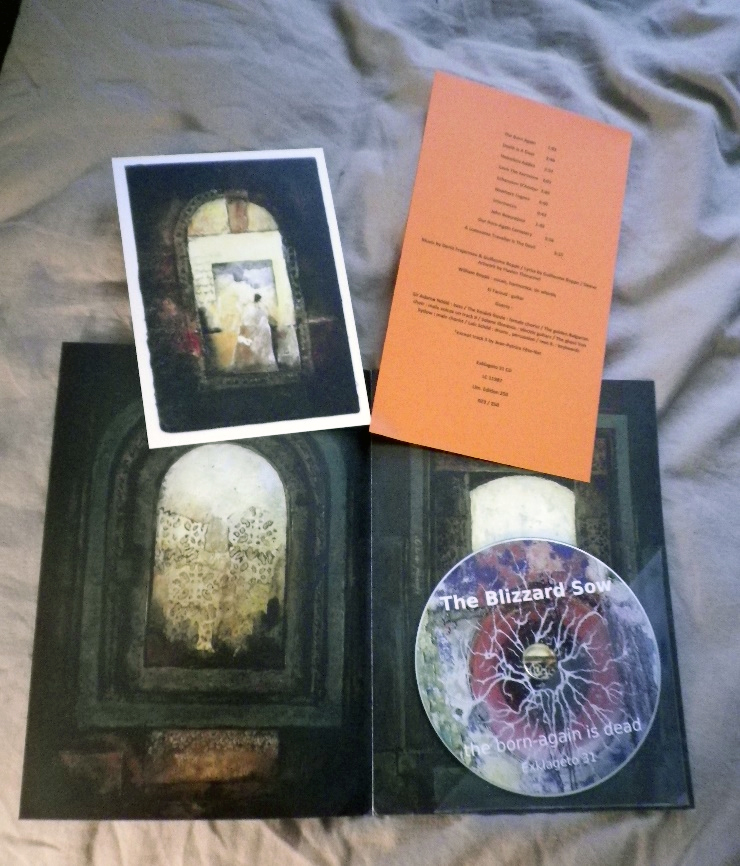
William Boppe : vocals, harmonica, tin whistle
El Faroud : guitar
Guests :
Sir Adama Ndélé : bass
The Koulak Goule : female chorist
The golden Bulgarian choir : male voices on track 9
Solene Illonescu : electric guitars
The ghost Von Sydow : male chorist
Loïc Schild : drums , percussion
Ivan B. : keyboards
Music : Denis Frajerman & Guillaume Boppe
Lyrics : Guillaume Boppe*
Artwork : Flavien Thieurmel
Graphic design : frau-unbekannt
Recorded and mixed by Denis Frajerman, Nautilia studios.
Mastering : Norscq
Producteur : Yann Caravan
*except track 5 by Jean-Patrice Fête-Nat
MEXICA BANANA’s characteristic ? Crossbreeding of traditional and popular musics (at that time rythm’n’blues, then soul and Cajun music, then psycho-rock, the flower power and the Amerindian rhythms.) From this came some gems alas forgotten such as the mythical serie of the Pyramidal music. Unfortunately, the « Bayou music » volume 7 commercial failure obliged MEXICANA BANANA to break off its activities for thirty years.
Nowadays, Yan Caravan decided to take over the label and to devote his wealth to the re-issue of the MEXICA BANANA sold out records, as well as to the production of new talent working in his cherished crossbreeded way. Based in Ukraine, MEXICA BANANA is looking for licence in order to distribute and print its records abroad.
« Nocturne, sweaty, upset, on the border of black magic and bayou’s mud, you will be bewitched by The Blizzard Sow nightmare pop spicy wreath »
Made out of the Boppe’s brothers (21 and 25 years old), the project reflects a furiously original universe out of any fashion or « popular tune » concessions. On the second record, « Baagou music », few Ukrainian, Romanian, Hungarian and Neapolitan appear as guests. Recorded within a few days in a Sighet suburb barn, « Baagou music » is a good antidote for the insipid broadcasted by the whole world radios and televisions.
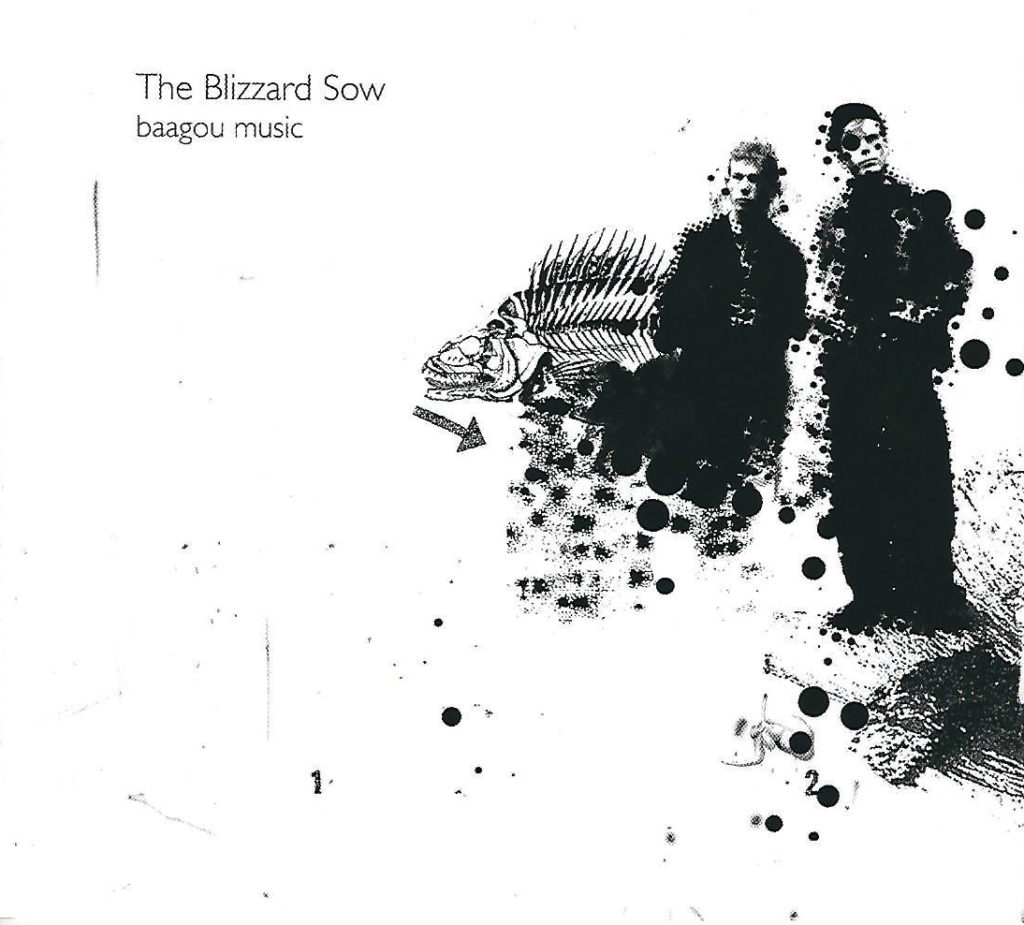
William Boppe: vocals
El Faroud: guitars, RBox, keyboards, bass, percussions, folk instruments, accordion.
Guests:
Mathias de Breyne: bass clarinette, alto saxophone
Stéfano Cavazzini: drums, cymbals
Keny2: sampler
Music by Denis Frajerman and Guillaume Boppe.Texts by Guillaume Boppe.Recorded and mixed by Denis Frajerman, Nautilia studios, 2004. Produced byYann Caravan for Mexica Banana. Graphic design: Sarah Arnal. Photo & logo Blizzard Sow: Iseult Fayolle. Mastering: Norscq
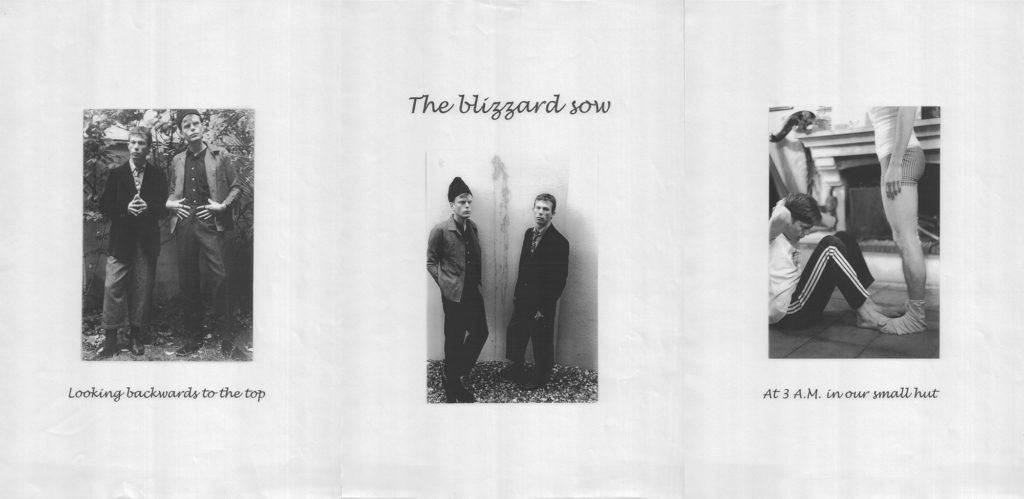
Muzzart
Groupe franco-ukrainien, composé des frères Boppe auxquels leur mère Zoïa, cantatrice internationale, a donné une éducation avant toute chose française, The Blizzard Sow a sorti ce Baagou music qui est son deuxième album, initialement, en 2004 chez Cynfeirdd. Celui-ci fut réédité en CD, en 2005, par le très précieux Infrastition. Aujourd’hui Atypeek Music, pas moins recommandable, le ressort en digital. Nombre de guests ukrainiens, roumains, hongrois et napolitains y prennent part, l’opus a par ailleurs été enregistré dans une grange de la banlieue de Sighet, en seulement quelques jours. William Boppe (vocals), El Faroud (guitars, RBox, keyboards, bass, percussions, folk instruments, accordion) y servent des trames inclassables; blues, folk, jazz dérangé, effluves du bout du monde ou plutôt dfe l’est, voix atypiques (décidément…) s’y confrontent magiquement (l’envoûtant A sordid tail from the bayou land, proche des dix minutes).
Tout ça se fait, bien entendu, dans une déviance délibérée. Mathias de Breyne (bass clarinette, alto saxophone), Stéfano Cavazzini (drums, cymbals) et Keny2 (sampler) épaulent la paire dans sa passionnante errance, le bien nommé We are eclipses l’impulse dans des airs folk déjà prenants. On sent, on entend aussi, le désir de pratiquer un son nouveau, marqué par la culture et le goût de ses différents géniteurs pour les chemins de traverse. On n’en fait jamais trop, quand le motif est trouvé on l’étaye, vocalement, avec un cachet récurrent. You walk alone, en seconde place, en fait montre. Finement ciselé, il couple distinction, timbre encanaillé et climat d’époque.
On a ici, le sens de l’atmosphère, du détail qui capte l’attention. C’est le cas, une nouvelle fois, sur The car song qui, au fur et à mesure de son avancée, s’assombrit et met le chant, pluriel, en exergue. Immersif, Baagou music est le remède parfait à la musique aseptisée. My sweetest mustard oppose les voix, ça lui permet une belle dualité. L’une amène de la vie, l’autre est plus “figée”, plus narrative. L’étoffe, ça ne surprendra personne, est splendide. Subtile, animée, sobre aussi. Ca suffit, largement, à ce que The Blizzard Sow rafle nos suffrages. Tes yeux au revoir, passé le A sordid tail from the bayou land cité plus haut, instaure le français. Il se fait porter, à l’issue de son début, par un rythme d’obédience électro. Superbe, comme le reste, dans le verbe et le son. Baagou music est un disque classieusement vicié, grandement addictif dès lors qu’on a pu le “dompter” quelque peu. Elastic rick, dans un délire chanté à la Tom Waits quand il “prend la sortie”, retient sa tension sans imploser. The internet is full of joy, dans ses traces, se déploie élégamment, selon un canevas plus “normal”, j’entends par là moins ouvertement “autre”.On ne décroche pas, en partisan des sonorités qui emmènent, de Baagou music. The lonely captain of madness nous balade sur six minutes entre beauté et folie bridée, dépaysement et magie musicale s’y nichent et en font toute la magie. On est conquis, est-il besoin de le préciser, de manière irrévocable. La réédition est pertinente, elle prend fin avec ce They dance at night fait de sifflements, d’un enrobage épuré. Le chant, lui, susurre, se tient prêt, presque en ensuite à vociférer…sans pourtant le faire. Sa démence, pourtant, point et contribue à grandir ce Baagou music dont on salue le retour. Il détient, sur ses dix plages d’éclat, tout ce qu’il faut pour prendre l’auditeur dans sa nasse, jusqu’à posséder ses sens et l’arracher à ses ennuyeuses commodités, l’initiant de fait à un trip sans détour.
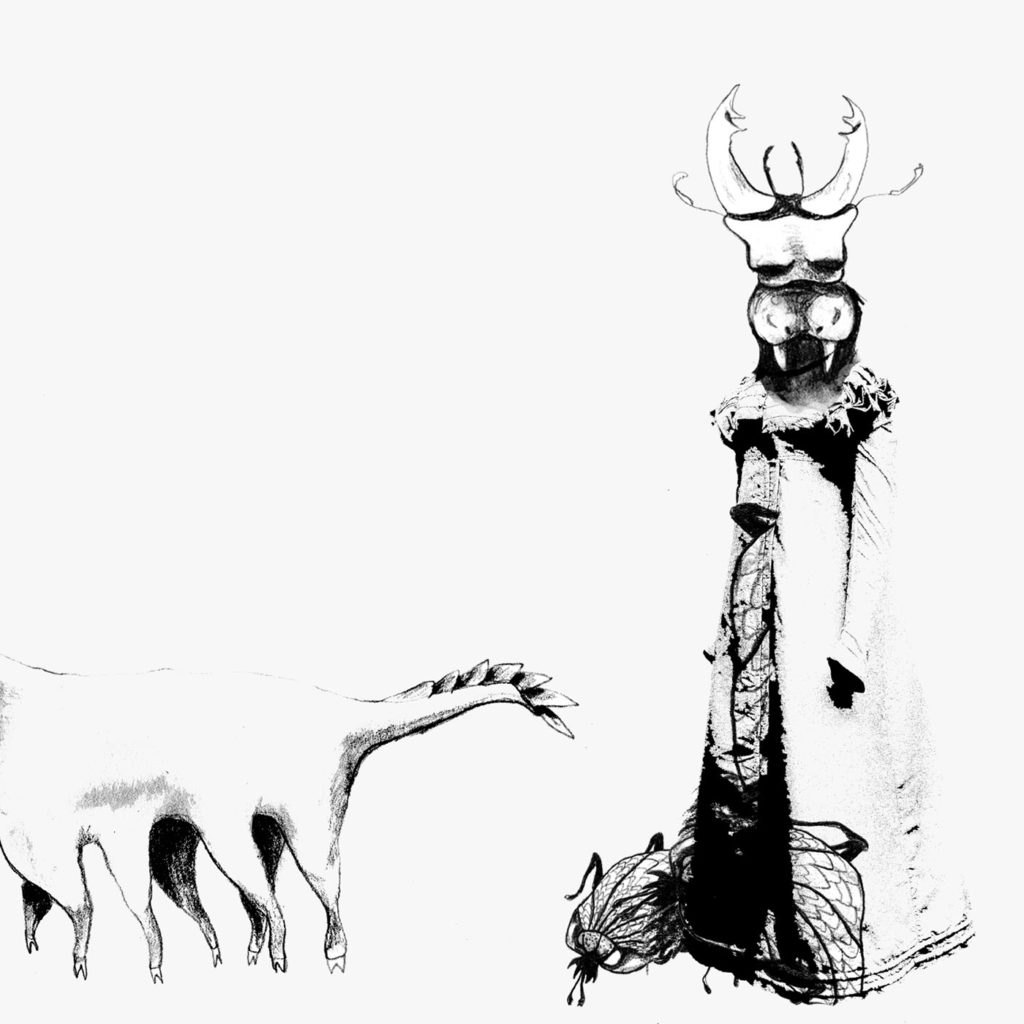
Foreword of Yann Caravan, producer of The Blizzard Sow
I was so surprised and curious when William Boppe told me about a project of songs inspired by the Sehnsucht* felt during visits at the psychiatric hospital where his brother stays evenly (the guitarist suffers from schizophrenia).
Listening to these strange songs, very simple, composed with a dictaphone, I instantly imagined the arrangements surrounded with smog and electric tension, just like the title William has given to his project: Foggy songs for the first periods. William, enthusiastic about my ideas (smart as they always are) immediately thought that Solene Illonescu (a female guitarist and composer, one of his father’s friends) could do the arrangements with the electric lightning strikes of her indomitable guitar. Then I confided the keyboards parts written by Solene to the young and gifted Ivan B., organist of the copte church of St Petersburg. Other musicians, friends of the Boppe brothers, completed the staff: the great free jazz drummer Leonidas Giovanni, the very sexy Victor Mirabelle playing saxophones and clarinets, and the marvellous touch of Doc Jim Sahel on one track (the The Homesick’s post-reggae).
Perfect to savour in your bath, that music will delicately pour his singing and strange sensual harmonies on your numbed limbs.
Enjoy !!
*nostalgia in the romantic way Goethe has described it.
William Boppe: vocals
El Faroud: keyboards, RBox, guitars, bass
Guests :
Mathias de Breyne: bass clarinett, alto saxophone
Stéfano Cavazzini: drums
Cassandre Girard: flute
Fanny Kobus: viola
Eric Roger: cornet
Laurent Rochelle: bass clarinett
Music by Denis Frajerman and Guillaume Boppe.Texts by Guillaume Boppe.Enginered and mixed by Denis Frajerman, Nautlia studios. L’homme absinthe was an order from Yann Pilas / Label Camembert électrique from an exhibition about the Mexique betwen 24 & 25 april 2021 at la « Ferme Saint Michel » in Confolens in France.
Producer: Yann Caravan
Graphic design: E-Klageto
Illustrations: Iseult Fayolle
Mastering: Norscq
From artwork by Iseult Fayolle
E-Klageto / La Bois / Psych.KG (Euskirchen)
William Boppe? THE BLiZZARD SOW? Erst als ich ‘Music by Denis Frajerman’ lese, fällt bei mir der Groschen. Von Guillaume Boppe stammen die Lyrics zweier Lieder auf «Rivières de la nuit», und Boppe hat als französischer Cousin von David Tibet die Neofolk- & Nightmare Pop-Songs auf «Baagou music» (2003, Cynfeirdd) angestimmt, zusammen mit Frajerman als The Blizzard Sow. Dass das als nocturne, moite, dérangée und an Schwarze Magie grenzende Album William & Ismaël B. zugeschrieben wird, den Söhnen einer ukrainischen Sängerin, die ihnen mit Apollinaire und Mauriac eine Sehnsucht nach Frankreich einflößte, dass es mit ukrainischen, rumänischen, ungarischen und neapolitanischen Freunden in Sighet entstanden sei, einem Ort, der als einstiger kommunistischer Gulag für ein Fortissimo aus frig, frica si foame (Kälte, Angst und Hunger) berüchtigt ist, steht allerdings eher für F wie Fake. 2009 raunte Boppe, zu Tapeklingklang und Deprorock von El Faroud, ‘Anita’ und ‘Our Marriage and Divorce’ als Vorgeschmack auf «Three trees outer of check» und «The sin of Muvalka», die jedoch nicht erschienen sind – anders als die bei Propos2 publizierten Lyrikbände «Vague» (2012), «Toi» (2014) & «Le Coude» (2017). Erst 2021 erklingt auf der sich ganz um Mexiko drehenden Camembert Électrique-Compilation «¡Ay Caramba!» (an der z. B. auch Antonella Aye Porcelluzzi und Hans Castrup beteiligt sind) ‘L’homme Absinthe’. Und ist, ebenso wie ‘Our Marriage and Divorce’, nun Teil von Foggy songs for the first periods (Exklageto 29), zehn Boppe-Songs und fünf Chansons, denen die Sehnsucht zugrunde liegt, die William ergriff, als er seinen Bruder in der Psychiatrie besuchte. Für die im Vorwort Solène Illonescu (guitariste et compositeure) zugeschriebenen Arrangements zeichnet im Impressum freilich Frajerman verantwortlich, und nicht der Organist der koptischen Kirche in St. Petersburg, sondern er, Frajerman aka El Faroud, spielt Keyboards, RBox, Guitars & Bass, neben Klangspuren von Viola oder Flöte und Laurent Rochelle an Bassklarinette, der auch schon auf «Rivières de la nuit» zu hören war. Boppe seinerseits präsentiert sich neben seinen Texten & Vocals als Übersetzer von «Hundert Länder, in denen die Rosen rot sind» [Cent pays où rouges sont les roses], Poesie von Sonia Abendlicht (1959-1988), einer DDR-Dichterin, unbekannter noch als der unbekannte Soldat, deren 3-Zeiler nach Baudelaire, Rimbaud, Apollinaire ‘riechen’. Im Juni hat Boppe sich im Rahmen der Ausstellung «A corps perdu» in Abais (bei Nîmes) mit «75 Scheren aus Eis“ [Soixante-quinze ciseaux de glace] weiterhin in diese feminine Fiktion verwandelt, um poetische Abendlicht-Proben in Glasröhrchen auszustellen. Als Sänger zieht er einen through the darkness of my body mit in unheimliche Phantasien, die Frajerman mit simplen Basstupfen, Zitterwellen und Coldwave-Maschinenbeats illustriert, ‘Homesick’ mit dub-weichem Backbeat, ‘Grammar of the deep sea’ mit orgeliger Tiefseemelodik. Boppes Timbre ist inzwischen ein sonorer Bariton, der einen einlullen und hypnotisieren kann, weil einen auch die Beats und Drones bedröhnen und die Gitarre einem die Flimmerhärchen flimmern lässt. In ‘The bus driver’, ‘The Christ on ice’ und ‘Feeding the highway’ schwingt ein Anhauch von David Lynch mit, eine düstere Gothicness mit dunklem Tamtam bei ‘The lights on the hill’, unheimliche Vogelschreie.
Der Gesang wie für sich und ganz abgekehrt von Popglamour, der Sound bei ‘The broken bike’ nur noch zermulmter Noise, während ‘Auntie Rosie’ zu Zweifingerkeyboard mit Dark Cabaret flirtet: She is not really a witch, she is not really a bitch, but… Für ‘Daddy has drunk the sea’ kommen wild knarrende Bassklarinetten ins Spiel, Eric Rogers Kornett beginnt zu röhren, doch letztlich bleibt wieder nur Orgelmoll. Mit ‘Dans les champs de la nuit’ steuert gleich das erste Chanson uptempo ins Desaster. ‘Le ramoneur’ wälzt sich mit Geflöte und wieder Bassklarinette in Ruß, ‘Plein d’etoiles’ zählt mit Keys und Gitarre klimpernd erst kinderliedhaft die Sterne, wird aber immer galaktischer. Zeit für den grünen Engel, der den Schädel spaltet mit Glockenspiel, Gruftbass und mexikanischer Trompete und den Absinth- Homme rekrutiert ins Regiment der Untergeher. Boppe endet mit ‘Que peut ton ivoire’ als ohrenzupfendem Drehwurm, als Rattenfänger oder, schlichter gesagt, Verführer, bei dem nie so ganz klar wird, ob er einen in Künstlerkneipen entführt, ins Mysterientheater oder als Kaminfegerjungen zu den schwarzen Brüdern. 48 Mit Denis Frajerman auf den «Rivières de la nuit», mit Guillaume Boppe ‘Dans les champs de la nuit’, mit DDAA «Dans la nuit du souterrain scientifique». Ah, DDAA. Dass Jean-Luc André, Jean- Philippe Fée & Sylvie Martineau Fée, seit 1977 Herz & Hand & Hirn von Déficit Des Années Antérieures in Lion Sur Mer im Corona-Sommer 2020 in ihrem Studio «Le souterrain scientifique» wieder kreativ gewesen sind, zeigt Ah La Faim ! Bigre Mens Tu ? (La Bois 35, 10» Lathe cut, 35 Expl. mit Artwork von frau-unbekannt). Der letzte Stand der Dinge war gewesen: Auf Psychofon Records ihre Feststellung «Dada est mort». Vive le Keuchisme! Und – auf Illusion Production – «Rapad- D-Rapad», ihre kosmogolische (sic!) Transformation von Eric Saties «Parade» in ein steampunk- orchestrales Pulsen und futuristisches Stampfen, Hämmern und vinylrubbeliges Brodeln. Mit Melone und Zwicker und, richtigrum betrachtet, doch wieder hinten raushängendem da-da. Auf «Ah La Faim ! Bigre Mens Tu ?» spielen sie mit animiertem Tamtam, halb Art-Brut-Gamelan, halb Marimba-Exotica, für ein tribales Tänzchen auf, mit kurioser Daxophonie auch, geklopften Steinchen, geklopftem und rhythmisch geriebenem Metall, sogar Phantomtrompete, was dem repetitiven Duktus einen Possible Worlds-Dreh gibt. Einerseits. Andererseits erklingt ein schwammiges Pulsen zu wieder Marimba, ein klapperndes und dumpfes Tamtam zu klagender Trompete und Wolfsgeheul, das sich jedoch allem zum Trotz mit Geflöte und summendem Singsang eingroovt, rasselig sirrend aufhellt und mit E-Gitarre und Steelpansound am Schwungrad kurbelt, dass es Echowellen wirft. Dieser archaisierende Exotismus einer Folklore imaginaire zieht sich als DDAAs Raison d’être durch die Jahrzehnte: Reine Africaine, Radio Tombouctou, Danse Papou 1980… Path in the Wakasa Forest 1982… Zeit- und Traumreisen nach Afrika und Japan, ins Mittelalter und ins Prähistorische… Chants et Tambours Maracayace d’Ankazoabo à Morafénobé 1992… De Gaulle à Bayeux als surrealer Sprung rückwärts… zeitgenössisch mit Joseph Beuys und Le Corbusier… mit dem Ph. K. Dick’schen Voight- Kampff Test Blade Runner-futuristisch… «Pourriture Cubique» [Fäulnis im Quadrat] = Victor Hugo hoch André Breton… mit einem Wort: Rruvurrhh!
Jean-Jacques Birgé – septembre 2021
Sehnsucht est un mot réputé intraduisible. J’aime le prononcer. Mon allemand me le permet, même si « ich habe es ganz verlernt ». La première fois il s’agissait d’une œuvre de Gustav Mahler. C’est ici le vague à l’âme ressenti par Guillaume Boppe au retour de ses visites de l’hôpital psychiatrique où son frère schizophrène séjourne régulièrement. Ses textes ont été mis en musique par Denis Frajerman qui a enregistré et mixé l’album Foggy Songs For The First Periods. J’ai aussitôt pensé à la collection d’anatomie pathologique située dans la Tour aux fous de Wien, la plus importante au monde. Avec Denis, nous avions arpenté ses couloirs circulaires il y a deux ans. De quoi faire tourner la tête. Cellules où chaque objet renvoie à une histoire douloureuse, parfois un enfer. J’ai d’ailleurs du mal à faire le tri parmi les pseudonymes de Denis (Ismaël Boppe ? El Faroud ? Yann Caravan ? Lesquels sont vrais ?), comme si il s’y perdait lui-même. En Autriche j’avais constaté son absence totale de sens de l’orientation ! Sous le nom The Blizzard Sow, le duo avait déjà publié Baagou Music en 2005. Quinze ans plus tard, c’est une nouvelle musique pour un autre retour du refoulé. Une pop sombre, minimaliste, incantatoire à laquelle participent le saxo-clarinettiste Mathias de Breyne, le batteur Stefano Cavazzini, la flûtiste Cassandre Girard, la violoniste Fanny Kobus, le cornettiste Eric Roger, le clarinettiste basse Laurent Rochelle. Là aussi je m’y perds dans les noms que le dossier de presse égrène. Heureusement ce n’est pas le propos. Frajerman aux claviers et guitares, Boppe vocalement, fabriquent des fictions musicales à partir du réel, mais ce réel semble toujours d’un autre monde.
Music Map
Questo disco l’ho ascoltato quattro volte, ma la migliore è stata l’ultima.
Perchè non è che un disco così lo si possa ascoltare a cuor leggero, mentre cucini le seppie o in coda sulla Milano-Venezia. Un disco così richiede dedizione. Ma totale, incondizionata. Vuole la tua disponibilità a perderti, a lasciarti sopraffare, a concederti senza remore.
Io sì che mi sono arreso come si deve.
Avevo mal di testa: l’età avanza, i primi freddi ti fanno scricchiolare cervicale e tempie. Allora ho preso la suprema decisione di ritirarmi nelle mie stanze, come i nobili nei castelli. Ho scaldato il cuscino svedese, mi sono preparato una tisana melissa e biancospino, ho abbassato leggermente le imposte, collegato il pc alla cassa bluetooth, ho premuto play e mi sono sdraiato come Tutankhamon (però vivo) nel sarcofago. Le sei di un sabato pomeriggio di ottobre, già di quel colore grigio-Milano che ci terremo fino a primavera.
Poi sono (ri)partiti i cinquantaquattro minuti di “Foggy songs for the first periods”, nuovo album – prodotto da Yann Caravan per la label tedesca E–Klageto – di The Blizzard Sow, duo francese formato dallo scrittore, poeta e cantante Guillaume Boppe e dal compositore Denis Frajerman. Protetti dalle identità fittizie di William Boppe e El Faroud e supportati da musicisti di valore assoluto, in arte si fanno chiamare The Boppe Brothers, ma è soltanto un altro dei molti trucchi di cui è disseminata la loro strada. Iniziata – tra parentesi – con “Baagou music”, esordio datato 2004 al quale la strana coppia ha dato un seguito a diciassette anni di distanza. Nel mezzo, la carriera solista di Denis, il canto del cigno dei Palo Alto, gli scritti di Guillaume. Poi questa perla nera: un disco ispirato dalla mestizia provata nel corso delle molte visite dello stesso Guillaume (che usa il termine-concetto goethiano di “Sensucht”) all’ospedale psichiatrico dove il fratello musicista è permanentemente ricoverato.
Fin qui, il dovere di cronaca.
Nel frattempo, nell’ora che volgeva al crepuscolo ho concesso a questa musica inafferrabile di afferrarmi lei come lei voleva, scivolandomi addosso, avvolgendomi come un manto, o come un sudario, non saprei. Ho lasciato che i pensieri vagassero senza costrizione, annebbiandomi un po’ la vista, ma riempiendomi l’anima ed il cervello di una strana mistura di ebbrezza narcotica e di cupa beatitudine. Durante “Homesick” ho creduto di ascoltare i Suicide, su “Grammar of the deep sea” i Japan. Impressioni, suggestioni. Un mondo nascosto.
Riuscire anche a definire quindici tracce così, è un’impresa.
Grossolanamente: immaginate lo Scott Walker periodo “Bish Bosch” che canta canzoni scritte dai For Carnation, con il profondo timbro cavernoso di Guillaume che indulge indifferentemente al melodrammatico o all’irrequieto, forte di una teatralità che oscilla dal raggelante all’esaltante con una disarmante, irrisoria facilità.
Nel mezzo del cammin, succede di tutto: l’impressione generale è quella di una finestra socchiusa sulla brughiera, dalla quale occhieggiare il passaggio repentino di una nuvola, di una figura, di un corvo, di un cavallo, di una carrozza. Dettagli: il resto rimane sfuggente e solo ipotizzabile, ciò che si percepisce è unicamente un angolino del panorama, che resta oscuro.
Dall’opener per basso, disturbi e feedback di “Bus driver” alla notte fonda di “Daddy has drunk the sea”, sventrata da fiati e dissonanze agghiaccianti prossimi alla contemporanea o alla no-wave, da una “The broken bike” che sarebbe piaciuta a Syd Barrett al cabaret mitteleuropeo di “Auntie Rosie” (Marc Almond docet), passando per l’afflizione conturbante à la David Tibet di “The Christ on ice” o per le atmosfere tetre e decadenti di “The lights on the hill” nelle cui stanze vuote e desolate risuona l’eco spettrale di Chelsea Wolfe, l’album è un florilegio di tessiture a stento prevedibili, un susseguirsi di suoni ed umori volubili, di spinte e frenate improvvise, di armonie mascherate e rumori gentili uniti dal fil rouge di un’indole umbratile, capace di mutare la luce in tenebra – e viceversa – nello spazio di una strofa.
Appunto: nell’arco dei sedici minuti finali, con un coup de theatre assolutamente impronosticabile visti i trentotto minuti precedenti, ecco una sequenza di cinque canzoni in francese dall’andatura lineare, perfino confortevole. “Dans les champs de la nuit” ha ritmo e melodia, palpita e scalpita con un feeling tra Bashung e Souchon mentre non più tardi di duecento secondi fa sembrava di soffocare in un cunicolo da incubo degno dei Naked City. E così via tra la breve e toccante “Le ramoneur”, la lullaby di “Plein d’etoiles”, la gentilezza ingannevole di “L’homme-absinthe” (scritta appositamente su commissione per una mostra sul Messico e rappresentata nell’aprile di quest’anno a Confolens), fino all’epilogo di “Que peut ton ivoire”, synth chiesastico e marcetta à la Thomas Fersen affogati in una coda notturna e suadente.
Tutto fuori posto nonostante le apparenze, o forse è l’esatto contrario, se è vero che per quasi un’ora pare di assistere alla proiezione in musica di un film di David Lynch.
E’ come in “Mulholland Drive”: riesci a seguire la trama fino ad un certo punto, poi devi lasciarti possedere senza porti troppe domande.
E arrenderti come si deve. (Manuel Maverna)
¡ AY CARAMBA !
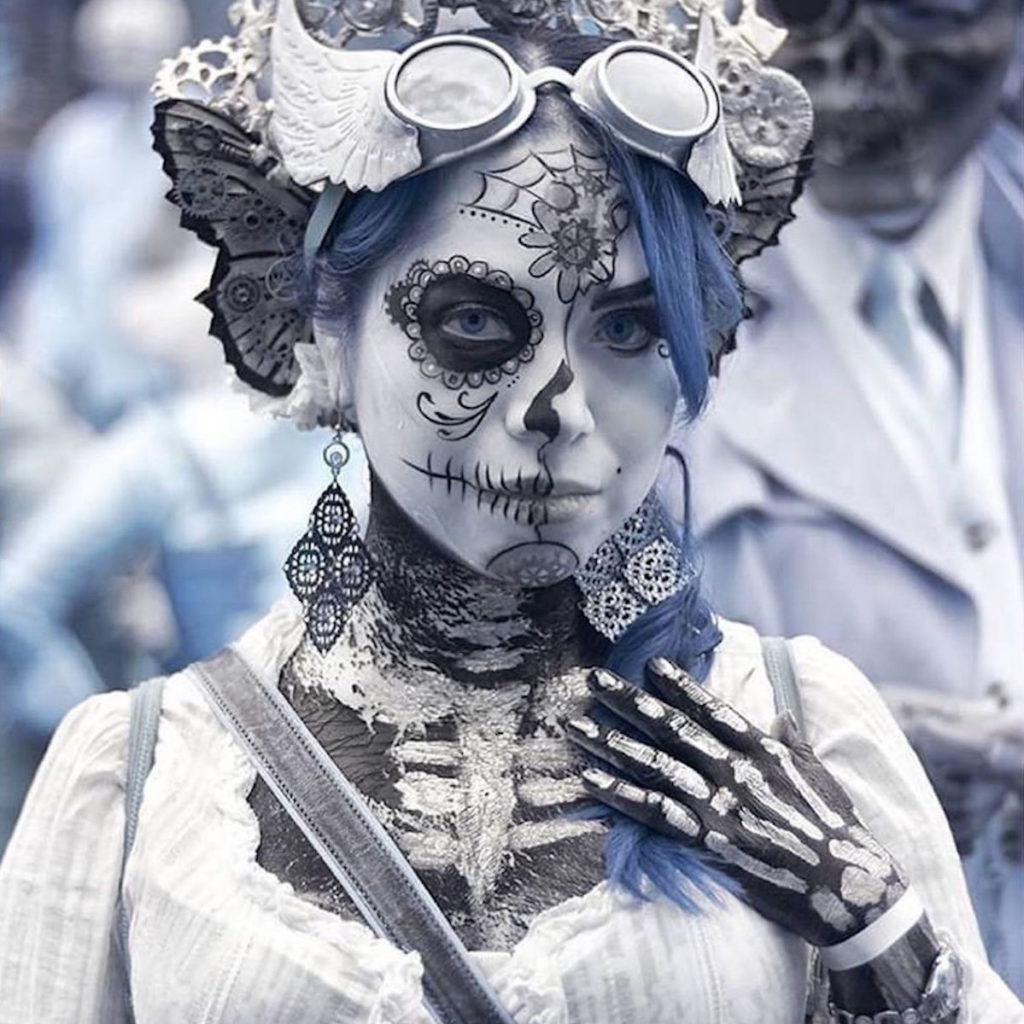
“L’homme-absinthe”
a track on Ay ! Caramba !, a compilation by Camembert ELectrique label, France, 2021
» At the beginning of this century, we went to Mexico for a study trip, in the footsteps of cartels and their relationship with museography. But we quickly gave up on our research to focus on the uplifting songs of the Mariachis and their uniquely nostalgic guitar playing.
One evening when we were leaning on the counter of one of Mexico City’s most secret bars, we met a man of absinthe (we could not describe otherwise the individual who led us that night to infinite drunkenness). We have composed this song as a tribute to this man, to Unica Zürn (The Man of Jasmine is the bedside book of the adopted daughter of our daughter), to the star Absinthe of the Apocalypse, to the female of the jaguar who steals the souls of cars, finally! to Mexico which had opened its doors to us ».
(translation
by Max Lachaud)
William Boppe: vocals
El Faroud: Rbox, guitars, bass guitar
Eric Roger: trumpet
Recorded and mixed by Denis Frajerman, Nautilia studios in 16 numerical tracks. Produced by Yann Caravan for Mexica Banana.
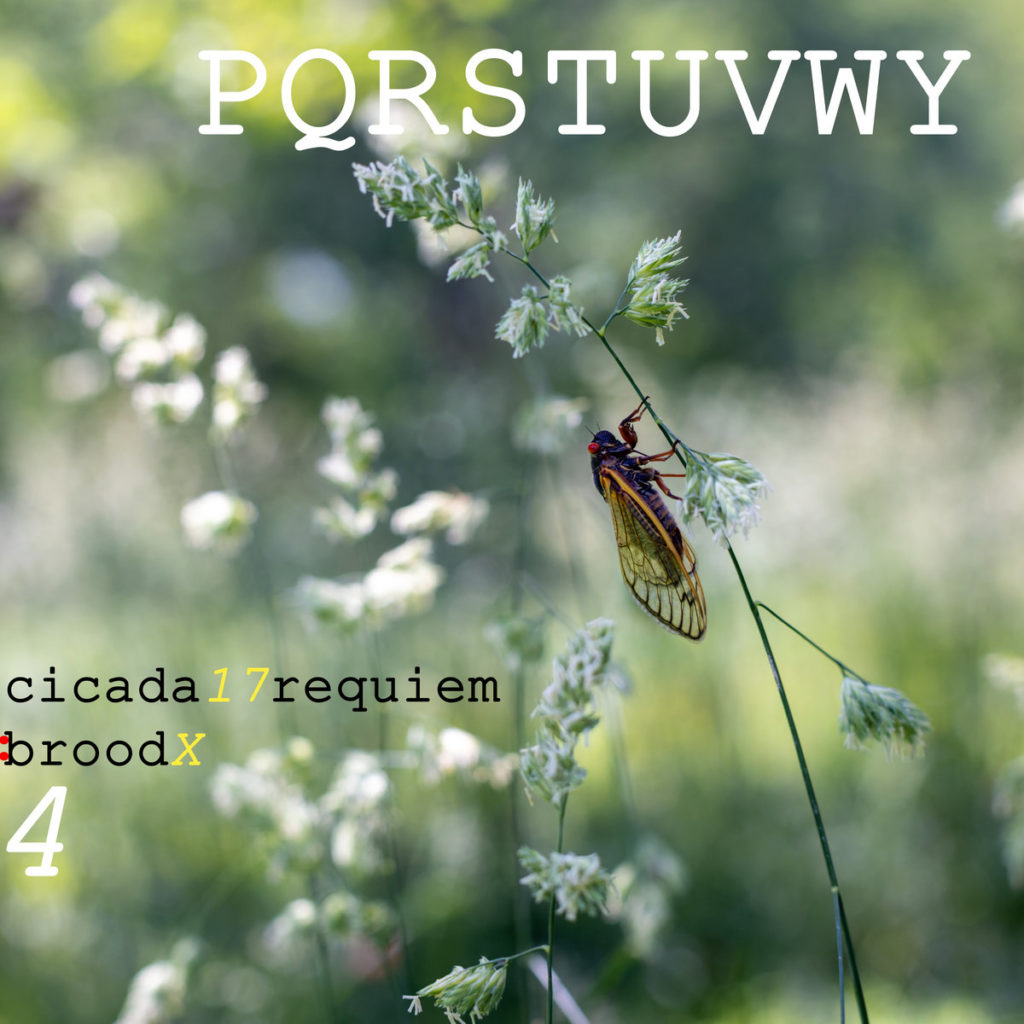
Litanies de Baal-Zebul
The Blizzard Sow “Litanies de Baal-Zebul”
Denis Frajerman: bass, keyboards, percussion
Guillaume Boppe: text, phone vocals
Composed and mixed by Denis Frajerman, Nautilia Studios in 24 numerical tracks September 2021.
Thanks to Yann Pillas for cuts.
In memoriam Rémy de Gourmont, Daniel Hulet et Simon le Magicien.
Fleur de mémoire, tu montes de sous le sol,
Fleur d’incendie, tu manges ma peau,
Fleur de colère, tu tombes dans ma bouche,
Ange de pitié, tu vas au crâne caresser,
Ange d’envers, tu sors fondre au soleil,
Ange de la nuit blanche, tu racles la rue,
Route vers le ciel, tu n’as plus de fin,
Route sans savoir, le soir se pose sur toi,
Route à revoir, tu étends tes mains,
Plafond des fleuves, où tu vas les cieux tombent,
Plafond des illusions, les villes s’écrasent dans ta poche,
Plafond qui n’existes pas, où aller quand on te voit,
Aile où parlent nos yeux, vole dans le soleil,
Aile qui viens du monde inconnu, prends-nous en pitié,
Aile qui retournes à la terre, tu as tant de vies,
Soir qui arrives, revois le temps un peu,
Soir qui voyages, passe les portes de notre ville,
Soir abandonné, dresse-moi sur ton cou,
Opium des insectes volants, je te suis dans le noir,
Opium où regardent les nuages, laisse ta poitrine sur nous,
Opium sans matins, trouve-nous dans la plaine,
Cigale et démon, porte la terre loin de nous,
Cigale et mort, tous ne te voient qui ne savent rien,
Cigale et ligne là-bas, trait tendu sur le monde, écoute.